
Guía de ayuda para padres y cuidadores para ayudar a las familias a enfrentar la enfermedad...
Ofrece información para padres y cuidadores sobre los brotes de enfermedades infecciosas en su comunidad.
Public health is the science of protecting and improving the health of people and their communities. This work is achieved by promoting healthy lifestyles, researching disease and injury prevention, and detecting, preventing and responding to infectious diseases. Overall, public health is concerned with protecting the health of entire populations. These populations can be as small as a local neighborhood, or as big as an entire country or region of the world (Center for Disease Control and Prevention, 2020).
When public health emergencies occur, there is rapidly evolving information that may be confusing and lead to feelings of anxiety. In the event of an outbreak in your community, your first concern is about how to protect and take care of yourself, your children and your family. Knowing important information about the outbreak and learning how to be prepared can reduce your stress and help calm likely anxieties.
These resources will help you think about how an infectious disease outbreak or pandemic might affect your family— both physically and emotionally—and what you can do to help your family cope in times of public health emergencies.

Ofrece información para padres y cuidadores sobre los brotes de enfermedades infecciosas en su comunidad.
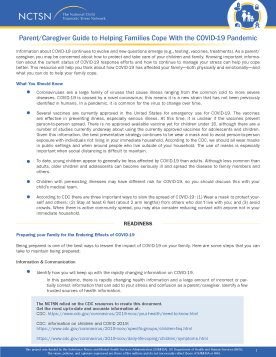
Provides information for parents and caregivers about infectious disease outbreaks in your community. Knowing important information about the outbreak and learning how to be prepared can reduce stress and help calm likely anxieties.
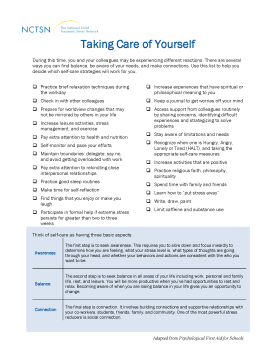
Offers providers a list of ideas for self-care strategies to use after a difficult event. This checklist outlines the three basics aspects of self-care including awareness, balance, and connection.
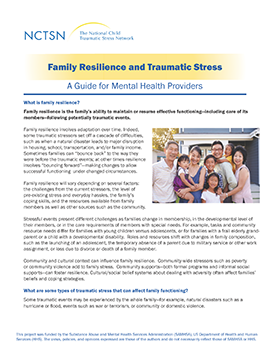
Provides information on family resilience. This fact sheet discusses a family's ability to maintain or resume effective functioning, including care of its members following potentially traumatic events.
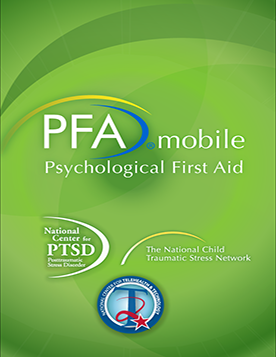
Lets responders review PFA guidelines and assess their readiness to deliver PFA in the field.
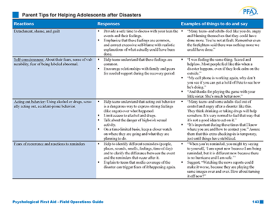
Is a handout from Psychological First Aid Field Operations Guide (PFA). This handout provides parents with common reactions after a disaster, ways to respond to those reactions, and examples of things you can say to your adolescent.

Is a handout from Psychological First Aid Field Operations Guide (PFA). This handout provides parents with common reactions after a disaster, ways to respond to those reactions, and examples of things you can say to your infants or toddlers.
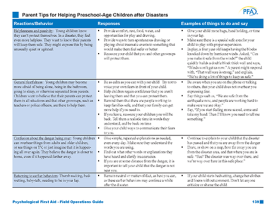
Is a handout from Psychological First Aid Field Operations Guide (PFA). This handout provides parents with common reactions after a disaster, ways to respond to those reactions, and examples of things you can say to your preschool-age child.
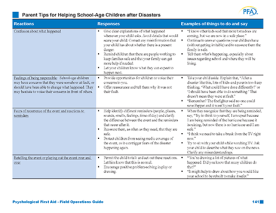
Is a handout from Psychological First Aid Field Operations Guide (PFA). This handout provides parents with common reactions after a disaster, ways to respond to those reactions, and examples of things you can say to your school-age child.
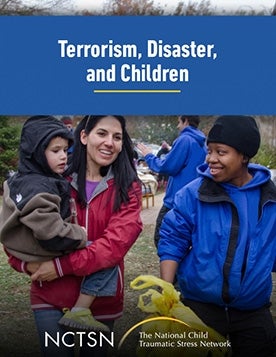
Describes poignant moments in the response to the September 11 terrorist attacks. This webinar discusses the impact on first responders' work, the role of the NCTSN, and what has occurred in the last decade for the disaster mental health field.
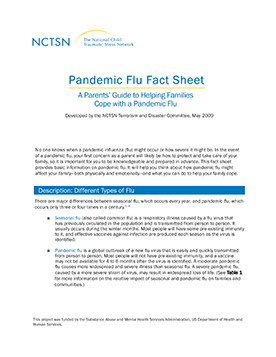
Offers parents information on helping their families cope with a pandemic flu.
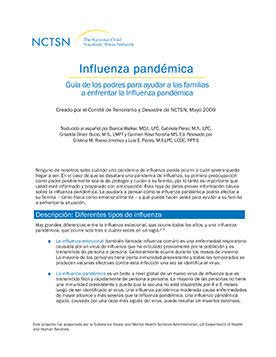
Offers parents information on helping their families cope with a pandemic flu.